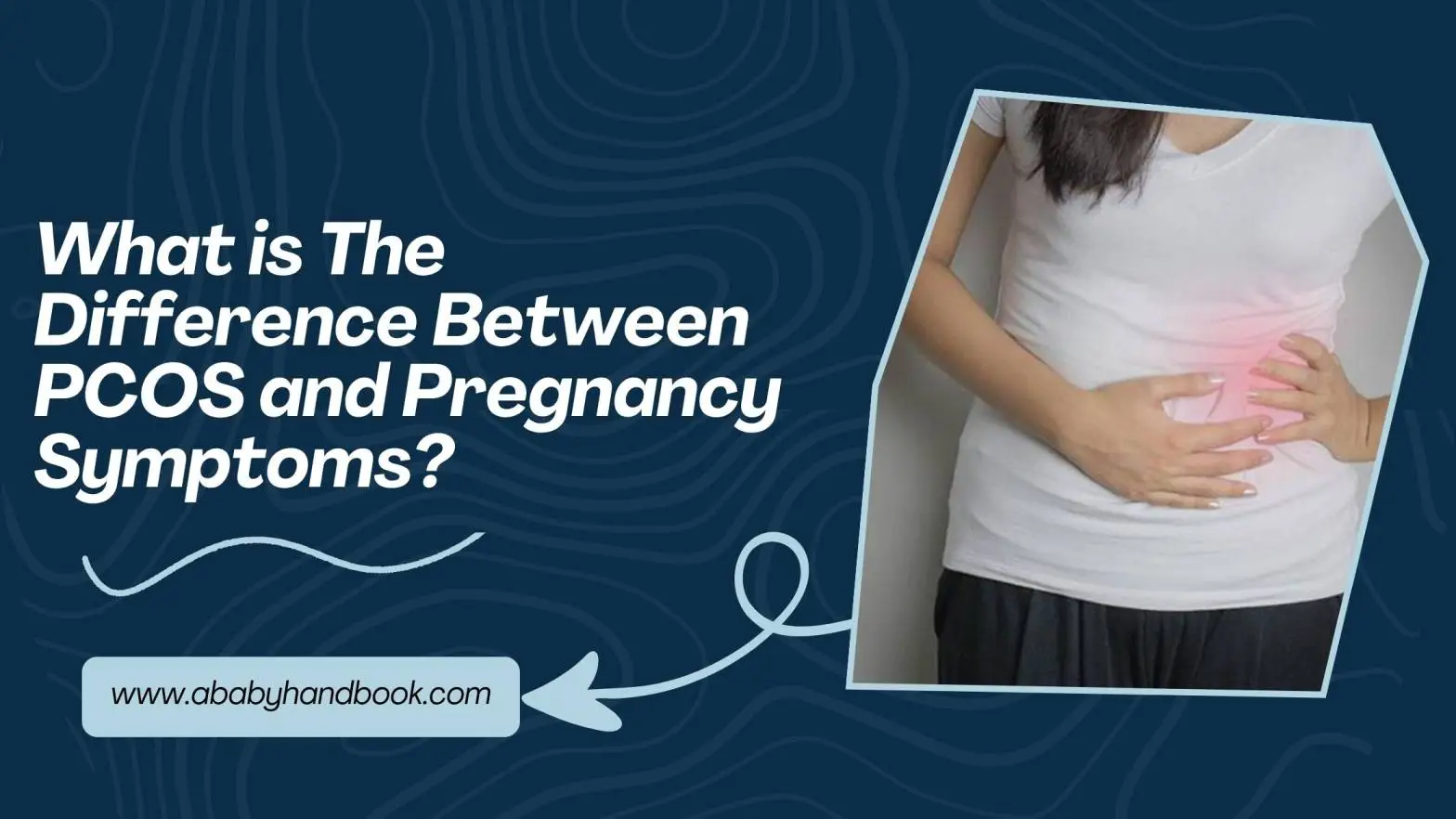PCOS may consist of irregular periods, fluctuations in the hormones, and several other things that may puzzle you in the process of pinpointing symptoms of PCOS and symptoms of pregnanc,y even at the early stages of pregnancy. The symptoms of PCOS and pregnancy are usually so close that people find them confusing and even anxiety-provoking. This paper will explain the variance between pregnancy and PCOS symptoms and give a clear apparent implication between these two illnesses. We are going to consider such symptoms as missed periods, nausea, tiredness, breast tenderness, and how they can be different in a person with PCOS compared to a newly pregnant woman. These differences are imperative to understand by anyone who is attempting to have a baby or just to understand their reproductive health. Difference Between PCOS and Pregnancy Symptoms.
The Overlap: Why It's So Confusing?

The main cause as to why it is really hard to distinguish the difference between the symptoms of PCOS and pregnancy is that there is a lot of overlap between them concerning the effects they have on the body. PCOS can be classified as a hormonal disorder that, in most cases, leads to irregular or absent periods. The old-time pregnancy test is a missed period, so, being a PCOS patient, a late period can be months of hormonal flare, or it can be a pregnancy.
In the same way, changes in hormone levels during both conditions may cause additional similar symptoms. As an example, mood swings, exhaustion, and even a little weight fluctuation are characteristic of PCOS and early pregnancy. In PCOS, hormonal changes are a result of an excess of male hormones (androgens), and in pregnancy, hCG, estrogen, and progesterone hormone surges.
It is an emotionally stressful process to trudge through this confusion. The story about PCOS and first-trimester pregnancy symptoms being so close to each other to make most of the women with PCOS realize they are pregnant only after advancing to their second trimester is just common. The important part is to focus on the details and pay attention to any other symptoms that can potentially lead to one or the other PCOS and first trimester pregnancy symptoms.
Read Also: Negative Pregnancy Test 12 Dpo
The Key Differences: A Closer Look at Shared Symptoms
Though a lot of the symptoms are similar, the severity, period, and associated symptoms can quickly make you lean towards the right condition. The most common symptoms can be broken down.
Irregular or Spots
- PCOS: The alternating menstrual cycle is characteristic of PCOS. These may be long, very light, or even absent. The irregularity is a long-term symptom that can last for years.
- Pregnancy: The first symptom of pregnancy is a missed period. In contrast to the chronic pattern of lack of regularity of PCOS, a missed menstrual period in an individual with a typical menstrual experience is a very powerful sign. In the case of a person with PCOS, a missed period is not as much of a sure indicator, meaning that they need to do a home pregnancy test. An authentic pregnancy will cause a period that is not only late but will contain no period at itself throughout the pregnancy.
Nausea and Vomiting
- PCOS: Though infrequent, a small proportion of women with PCOS will have nausea, and this is blamed on their blood sugar and insulin resistance. This kind of nausea is not highly serious, and it may be caused by the time the meals are taken or some foods.
- Pregnancy: Nausea is another common symptom of pregnancy during early pregnancy, known as morning sickness. It might occur at any time of the day, and in a good number of cases, it is a different and ongoing sensation. It has been assumed it is due to the higher production of such hormones, particularly hCG, which leads to nausea during pregnancy. It may be accompanied by a keen sense of smell in addition to a loathing for certain foodstuffs.
Fatigue
- PCOS: Very common symptoms of PCOS include fatigue, which may be coupled with insulin resistance, poor sleep, and hormonal imbalances. This is the fatigue that is normally chronic and tends to be regarded as continuous to the fatigued.
- Pregnancy: Pregnancy fatigue is a fresh feeling and a feeling that is sometimes too much. It is the way your body informs you to calm down and relax because it is doing its level best to construct the placenta and gestating fetus. The tiredness to which this fatigue is generally differentiated is the chronic fatigue experienced with PCOS overall. It is normally of a sudden and deep-seated nature.
Breast Tenderness
- PCOS: PCOS can also be accompanied by breast tenderness or sensitivity when a woman is on the onset of having her period, and there may also be an imbalance in the levels of the hormones, especially the higher level of estrogen concerning the progesterone levels.
- Pregnancy: It is possible to identify the swelling in the breast more easily during an early pregnancy. They become sore, tender, and heavier. Also, there is a likelihood of the regions around the nipple (areolas) being dark and the veins on the breasts being prominent. It is a direct result of the hormone shift that is preparing the breasts to lactate.
You May Also Like: Aching Shoulders In Pregnancy
How to Detect Pregnancy with PCOS: The Definitive Guide?

Due to such a confusing overlap, using only the symptoms to determine pregnancy in PCOS is ineffective. Pregnancy testing is the most plausible method of ascertaining a pregnancy.
- Home Pregnancy Tests: These are tests that find out the occurrence of the hormone human chorionic gonadotropin (hCG) in your urine. A missed or delayed period is when it is good to wait a week or two before taking a test, particularly in case one has PCOS. The reason behind this is that the irregular cycles may make it difficult to know on which day one is ovulating, and an early pregnancy test may result in a false negative. To get a better outcome, use a first-morning urine sample because it is the most Unusual pregnancy symptoms with PCOS.
- Blood Tests: This is the most sensitive method by which a pregnancy can be confirmed at your doctor's office by taking a blood test. It is more sensitive than a home urine test to hCG. The level of hCG in your blood can be measured so precisely by a quantitative blood test, also called a beta hCG test, that these tests are frequently used to track the development of a pregnancy during the early part of a pregnancy.
- Ultrasound: Unquestionably the surest means of establishing the fact of being pregnant, very often along with an approximate date of delivery. Up to 4-5 weeks of pregnancy, a gestational sac can be detected with the help of a transvaginal ultrasound.
- Listen to Your Body, but Don't Rely Solely on Symptoms: It is always a good idea to be in touch with the body, especially the one that has the worst symptoms of PCOS and first trimester pregnancy, but it is always advisable that one should not use the feelings as the sole confirmation of symptoms. Include your symptoms as a reminder to get a test, use them, NOT as a verdict.
Conclusion
A person with PCOS must understand the distinction between PCOS and pregnancy symptoms. Although most symptoms overlap, it is possible to gain insights on how to act, referring to the strength, the length of feeling, and the novelty of this or that emotion. Of course, not finding a period in a woman with PCOS is not so obvious as in a woman with a normal cycle. To verify that a pregnancy occurs, there is only one sure method, and Difference Between PCOS and Pregnancy Symptoms that is through either a pregnancy test (home or blood) or by ultrasound.
It is also worth reading the stories under the heading of Pregnancy symptoms with PCOS stories, because, as well as making sure that you are not alone in having this difficulty, you find ways of dealing with it. PCOS tends to present many women with a journey of being confused and finding hope. There are a few techniques to make the process more straightforward and solid: stay active with testing and communicate openly with your healthcare provider. It might be a journey that is fraught with certain challenges, but what is indisputable is that motherhood with PCOS is possible, provided you have the right information and support of a doctor.








